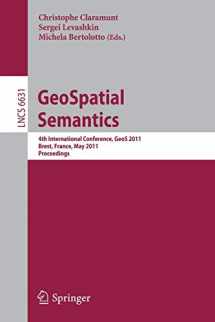
GeoSpatial Semantics: 4th International Conference, GeoS 2011, Brest, France, May 12-13, 2011, Proceedings (Lecture Notes in Computer Science, 6631)
ISBN-13:
9783642206290
ISBN-10:
3642206298
Edition:
2011
Author:
Christophe Claramunt, Michela Bertolotto, Sergei Levashkin
Publication date:
2011
Publisher:
Springer
Format:
Paperback
247 pages
Category:
AI & Machine Learning
,
Data Mining
,
Databases & Big Data
,
Geology
,
Earth Sciences
,
Computer Science
FREE US shipping
Book details
ISBN-13:
9783642206290
ISBN-10:
3642206298
Edition:
2011
Author:
Christophe Claramunt, Michela Bertolotto, Sergei Levashkin
Publication date:
2011
Publisher:
Springer
Format:
Paperback
247 pages
Category:
AI & Machine Learning
,
Data Mining
,
Databases & Big Data
,
Geology
,
Earth Sciences
,
Computer Science
Summary
GeoSpatial Semantics: 4th International Conference, GeoS 2011, Brest, France, May 12-13, 2011, Proceedings (Lecture Notes in Computer Science, 6631) (ISBN-13: 9783642206290 and ISBN-10: 3642206298), written by authors
Christophe Claramunt, Michela Bertolotto, Sergei Levashkin, was published by Springer in 2011.
With an overall rating of 4.0 stars, it's a notable title among other
AI & Machine Learning
(Data Mining, Databases & Big Data, Geology, Earth Sciences, Computer Science) books. You can easily purchase or rent GeoSpatial Semantics: 4th International Conference, GeoS 2011, Brest, France, May 12-13, 2011, Proceedings (Lecture Notes in Computer Science, 6631) (Paperback) from BooksRun,
along with many other new and used
AI & Machine Learning
books
and textbooks.
And, if you're looking to sell your copy, our current buyback offer is $0.3.
Description
This book constitutes the refereed proceedings of the 4th International Conference on GeoSpatial Semantics, GeoS 2011, held in Brest, France, in May 2011. The 13 papers presented together with 1 invited talk were carefully reviewed and selected from 23 submissions. The papers focus on formal and semantic approaches, time and activity-based patterns, ontologies, as well as quality, conflicts and semantic integration. They are organized in topical sections on ontologies and gazetteers, activity-based and temporal issues, models, quality and semantic similarities, and retrieval and discovery methods.


We would LOVE it if you could help us and other readers by reviewing the book
Book review

Congratulations! We have received your book review.
{user}
{createdAt}
by {truncated_author}


